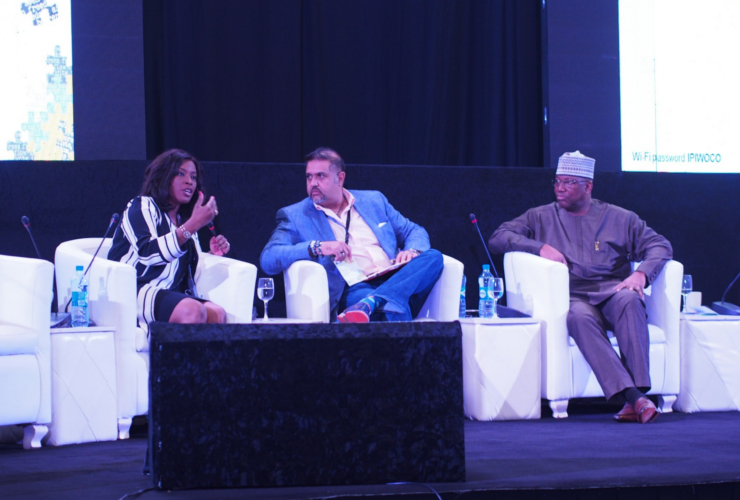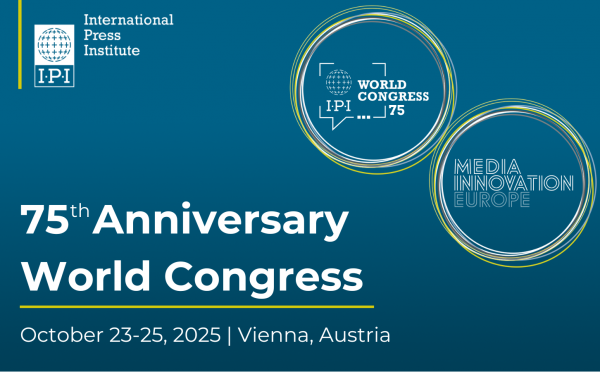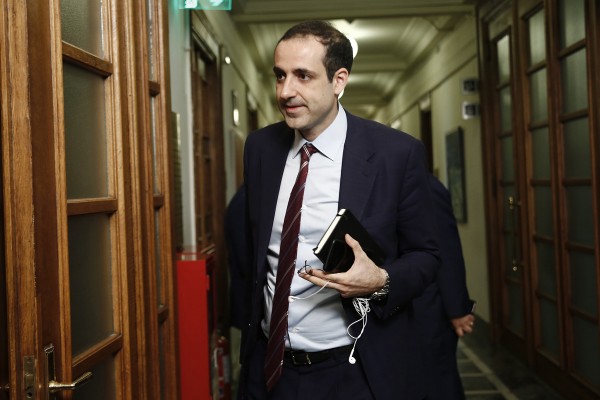The African media sphere is a study in contrasts: vibrant and courageous, but also facing big challenges to which no quick fix exists. Last week, the Africa Media Forum at the International Press Institute (IPI)’s 2018 World Congress in Abuja, Nigeria provided participants with a comprehensive outlook on the continent’s diverse and dynamic media landscape.
The Forum started with a discussion on recent political transitions on the continent and how they might be expected to affect independent journalism. Panellists Gwen Lister of Namibia Media Trust; former BBC Africa correspondent Mark Doyle; Nation Media Group Editor-in-Chief Tom Mshindi; and Organized Crime and Corruption Reporting Project (OCCRP) Africa Editor Khadija Sharife focused their comments on the importance of the relationship between African media outlets and their audiences. Several of the panellists expressed concern about a loss of trust and support from readers and viewers, a concern reflected in the World Congress’s main theme, “Why Good Journalism Matters”.
“We can fight governments in any turn, but people do not understand that if freedom of media is eroded, their freedom goes next”, Lister remarked. “How does journalism get back the support of the people in challenging those undemocratic environments that still exist on the continent?”
Sharife offered strong remarks on the responsibility of journalists to turn passive audiences into active citizens. For members of the public to get the most out of democracy they must become conscious, and it is journalists who have the power to awaken them by writing against official narratives, she said.
“The question is not how to get the public’s trust back, but rather how the public can be conscious of the truth. Journalists’ role is to put truth on the public record, whether the public trusts them or not.”
Dangerous working conditions
When talking about Nigeria, it is almost impossible not to talk about terrorism. The extremist group Boko Haram has terrorized northern Nigeria since 2009, claiming tens of thousands of lives and causing more than 9 billion dollars in damage. Amid this destruction, Boko Haram has also affected the lives and minds of many journalists and their families.
“Covering Boko Haram has caused trauma for many journalists”, Hamza Idris, politics editor for Nigeria’s Daily Trust newspaper, told Forum participants during a panel on terrorism and conflict in Africa.
“We (the media in Nigeria) were not prepared for this”, Idris said, recounting that in the early days of the conflict journalists would often fall prey to Boko Haram “strategies” such as enticing onlookers to the site of a first bomb before detonating a second one.
Besides the psychological trauma and the life-threatening risks, journalists in Nigeria who still brave the danger to cover Boko Haram generally lack insurance and many, especially those based in the volatile northeast, go unpaid, Idris noted. After the 2014 Chibok schoolgirls kidnapping, even foreign journalists began to experience difficulties, as Nigeria’s embarrassed government started to deny reporting visas, he added.
Looking eastwards, Kenya has also had to deal with terrorism, with the activities of the Somali terrorist group Al-Shabaab spilling over into the country. Victor Bwire of the Media Council of Kenya explained that local Kenyan journalists had had a tough time learning how to cover the issue without assisting terrorists in reaching their goals of fear-mongering and polarization, a dilemma that Hamza also eloquently described with respect to Nigeria.
“When we are stuck with showing mutilated bodies on frontpages, we are playing into terrorists’ hands”, Bwire said. “Journalists need new narratives to cover terrorism, for example, telling stories of community resilience.”
Apart from terrorism, communal violence is a big issue in many countries in Africa, particularly those that struggle with drought. Both in Kenya and Nigeria, most conflicts involve quarrels over resources, including land, water and wildlife. While the Congress took place in Abuja, herdsmen in central Nigeria attacked a farming community, killing 86 people.
The Africa Media Forum also featured a special discussion on covering natural resources and the extractive sector in Africa. Umaru Fofana, BBC correspondent in Sierra Leone and CEO of FreeMedia Group, told participants that the main issues that prevent local journalists from properly covering the extractive sector are a lack of resources and journalistic skills, but also corruption and bribery, which can take many forms.
“Mining companies fund newspapers who need the money”, Fofana noted as an example.
Khadija Sharife, OCCRP’s Africa editor, emphasized that poorly paid journalists are easy targets to bribe. To tackle this issue, she said, media outlets should pay their journalists and take a strong stance to maintain independence from big, corrupting players.
State censorship
In many African countries, governments try to repress free press and muzzle critical voices. Deodatus Balile from the Tanzania Editors Forum; Barbara Kaija, editor-in-chief of Uganda’s New Vision newspaper; and Joan Chirwa, editor-in-chief of Zambia’s The Mast newspaper spoke to the Africa Media Forum about their experiences in dealing with state attempts to stifle independent journalism.
Chirwa knows the might of state oppression well. Her previous newspaper, The Post, where she worked as managing editor, was forcibly closed by the Zambian government in 2016 for its critical reporting despite vociferous protests by international press freedom groups like IPI. Together with other former Post colleagues, Chirwa later founded The Mast, whose independent reporting is a regular target of government attacks.
“The state sees everything The Mast does as propaganda”, Chirwa said.
Still, she expressed optimism that the public was beginning to realize that the state’s smear campaigns against the media were not to be trusted. The Mast has a loyal audience, she noted, that supports its efforts to report the truth.
According to the panellists, the greatest tool to shield against government harassment is professional reporting with watertight facts.
“I could stand in front of any court, because I knew I had my facts straight”, Kaija said.
Kaija recounted a story involving a New Vision article about a Finnish businessman found dead in a Ugandan hotel. After the New Vision journalist who broke the story was kidnapped by several corrupt security officials, international attention brought him back alive and well.
“During those nine days, we kept repeating the story and the facts and how we got the story” she said. “Then we called the international press, got our story out on BBC and other media. After that, the government had to intervene.”
Balile offered a reminder that in addition to governments, private players prefer a muzzled press as well. He mentioned Vodafone as an example, suggesting that few stories are published on allegations surrounding the company’s tax practices. Whenever a story is about to go to press, the company threatens journalists with lawsuits, Balile said. Those threats leave a mark.
“Self-censorship has found its way to Tanzania,” Balile remarked. “Many good stories are not published.”
Digital first
Other topics discussed during the Africa Media Forum included financial issues and poor working conditions of journalists, with insights from Ralph Akinfeleye, professor of journalism and mass communication at the University of Lagos; Funke Egbemode, president of the Nigerian Guild of Editors; Mohammed Idris, publisher of Blueprint Newspapers; and Abdulwaheed Odusile, president of the Federation of African Journalists (FAJ).
The Congress also featured a presentation by African Media Initiative (AMI) CEO Roukaya Kasenally on the importance of shaping a new Africa narrative.
“There is very little interest from African countries to cover news from other African countries”, Kasenally remarked. “If the continent doesn’t cover itself, then who covers it?”
Lisa Anne Essex of the European Journalism Centre (EJC) presented the EJC’s guide for African journalists covering development issues. She also introduced the EJC-supported Top Story Africa, a highly successful reality television programme that challenges university journalism students to write the “top story”. The programme, broadcast in Kenya, wrapped up its second season this spring.
Also notable was a discussion on the future of African journalism featuring the CEO of Nigeria’s Channels Media Group, John Momoh, and Google’s country director for Nigeria, Juliet Ehimuan. Together, they spoke about the vast possibilities for the future of independent, digital-driven journalism in Africa, while also debating the role of tech companies like Google, particularly when it comes to revenue sharing with publishing houses.
“Google is trying to help publishers (in Africa) meet users where they are”, Ehimuan said.
Momoh described with pride Channels’s “digital-first” strategy for reporting the news but added: “Most of the money goes back to Google, so we need to have that conversation with them.”



